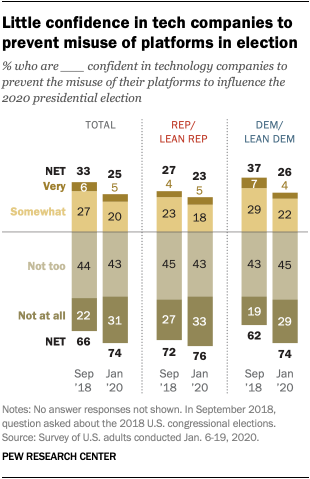SOCIAL
New Report Shows That 74% of People Don’t Believe Tech Platforms Will Be Able to Stop Political Manipulation

In what will likely come as little surprise, a new study from Pew Research has shown that 74% of Americans have little to no confidence that tech companies, including Facebook, Twitter and Google, will be able to prevent the misuse of their platforms to influence the outcome of the 2020 presidential election.

As you can see here, trust levels are similar across the political divide this time around, in slight variance to the same survey in 2018.
As per Pew:
“Confidence in technology companies to prevent the misuse of their platforms is even lower than it was in the weeks before the 2018 midterm elections, when about two-thirds of adults had little confidence these companies would prevent election influence on their platforms.”
Again, that’s not a major surprise. Another survey published by Pew earlier this month also found that both Republicans and Democrats “register far more distrust than trust of social media sites as sources for political and election news”, with 59% of respondents specifically noting that they do not trust the news content they see on Facebook.
So people don’t trust the news they’re seeing on social platforms already. Given this, it makes sense that they also don’t have much faith in avoiding manipulation. And while each platform has implemented new measures to better protect users, and weed out “inauthentic” actions, the data would suggest that it’s not enough.
It’s worth noting too that this latest survey was conducted between January 6th and January 19th, 2020, and incorporates responses from 12,638 people.
But while users don’t currently have a lot of faith, they do believe that technology companies should do more to stop the spread of misinformation.

As you can see here, 78% of respondents agree that tech companies “have a responsibility to prevent the misuse of their platforms to influence the 2020 Presidential election”.
So, to recap, people don’t trust the news they’re seeing on digital platforms, and have little faith that the situation will improve – even though they feel that the providers have a responsibility to do so.
The bigger question then is “does that matter?”
I don’t mean that in a moralistic sense – of course it matters that people are potentially being manipulated. But I mean in terms of what impacts that will have – will people, for example, stop getting their news content from Facebook and other platforms as a result of this lack of trust, as noted in their responses?
Do you want to know the answer?
Historical evidence shows that people won’t stop using Facebook as a result of these trends. They probably should, right? If people believe that they may well be manipulated by social media news coverage, maybe it’d be better to get off of these apps, and stop getting their news coverage from them. But that won’t happen.
Case in point – in yet another Pew Research report, its researchers found that, in 2016, the year of the last Presidential election, 62% of Americans got at least some of their news content from social media. In 2018, after all the discussion around foreign interference and manipulation, amid all the coverage around social media misuse by political activists. After all that, guess what happened?

More people now get more of their news exposure through social media. So while it’s one thing for people to say ‘we don’t trust what we see’, it’s another thing to actually get them to take action on such, and actively stop using social channels to source news content.
Because that’s hard to do. More than just content, social platforms provide engagement, and the dopamine rush of likes and shares. That can be addictive – so while people don’t necessarily agree with what they’re seeing online, they do like to engage with it, they like to argue against it, to virtue signal in the comments. If you’re looking for the reason why we’re so divided along political lines these days, look to the engagement that people see in disagreement, the allure of the battle which few can resist.
Sure, I might dislike my uncle’s views on climate change, for example, which he regularly shares on Facebook. But you can bet that in quiet moments, I’m going to check in on his posts. Because it’s addictive, the anger and outrage, like poking a wound to feel that little twinge of pain. It solidifies you in your beliefs – and when you finally feel the need to respond and call him/her out, there’s a rush in that engagement.
It’s not surprising that people distrust Facebook as a news source in this sense. But they’re still going there for the fight. And I would argue that Facebook is okay with that, as opposed to feeling any significant need to play referee and quell disagreement.
So while this new survey doesn’t reveal any amazing insights, it is interesting to note what it suggests, in terms of broader behavioral trends, and what that means for civic discussion and engagement.
SOCIAL
Snapchat Explores New Messaging Retention Feature: A Game-Changer or Risky Move?

In a recent announcement, Snapchat revealed a groundbreaking update that challenges its traditional design ethos. The platform is experimenting with an option that allows users to defy the 24-hour auto-delete rule, a feature synonymous with Snapchat’s ephemeral messaging model.
The proposed change aims to introduce a “Never delete” option in messaging retention settings, aligning Snapchat more closely with conventional messaging apps. While this move may blur Snapchat’s distinctive selling point, Snap appears convinced of its necessity.
According to Snap, the decision stems from user feedback and a commitment to innovation based on user needs. The company aims to provide greater flexibility and control over conversations, catering to the preferences of its community.
Currently undergoing trials in select markets, the new feature empowers users to adjust retention settings on a conversation-by-conversation basis. Flexibility remains paramount, with participants able to modify settings within chats and receive in-chat notifications to ensure transparency.
Snapchat underscores that the default auto-delete feature will persist, reinforcing its design philosophy centered on ephemerality. However, with the app gaining traction as a primary messaging platform, the option offers users a means to preserve longer chat histories.
The update marks a pivotal moment for Snapchat, renowned for its disappearing message premise, especially popular among younger demographics. Retaining this focus has been pivotal to Snapchat’s identity, but the shift suggests a broader strategy aimed at diversifying its user base.
This strategy may appeal particularly to older demographics, potentially extending Snapchat’s relevance as users age. By emulating features of conventional messaging platforms, Snapchat seeks to enhance its appeal and broaden its reach.
Yet, the introduction of message retention poses questions about Snapchat’s uniqueness. While addressing user demands, the risk of diluting Snapchat’s distinctiveness looms large.
As Snapchat ventures into uncharted territory, the outcome of this experiment remains uncertain. Will message retention propel Snapchat to new heights, or will it compromise the platform’s uniqueness?
Only time will tell.
SOCIAL
Catering to specific audience boosts your business, says accountant turned coach

While it is tempting to try to appeal to a broad audience, the founder of alcohol-free coaching service Just the Tonic, Sandra Parker, believes the best thing you can do for your business is focus on your niche. Here’s how she did just that.
When running a business, reaching out to as many clients as possible can be tempting. But it also risks making your marketing “too generic,” warns Sandra Parker, the founder of Just The Tonic Coaching.
“From the very start of my business, I knew exactly who I could help and who I couldn’t,” Parker told My Biggest Lessons.
Parker struggled with alcohol dependence as a young professional. Today, her business targets high-achieving individuals who face challenges similar to those she had early in her career.
“I understand their frustrations, I understand their fears, and I understand their coping mechanisms and the stories they’re telling themselves,” Parker said. “Because of that, I’m able to market very effectively, to speak in a language that they understand, and am able to reach them.”Â
“I believe that it’s really important that you know exactly who your customer or your client is, and you target them, and you resist the temptation to make your marketing too generic to try and reach everyone,” she explained.
“If you speak specifically to your target clients, you will reach them, and I believe that’s the way that you’re going to be more successful.
Watch the video for more of Sandra Parker’s biggest lessons.
SOCIAL
Instagram Tests Live-Stream Games to Enhance Engagement

Instagram’s testing out some new options to help spice up your live-streams in the app, with some live broadcasters now able to select a game that they can play with viewers in-stream.
As you can see in these example screens, posted by Ahmed Ghanem, some creators now have the option to play either “This or That”, a question and answer prompt that you can share with your viewers, or “Trivia”, to generate more engagement within your IG live-streams.
That could be a simple way to spark more conversation and interaction, which could then lead into further engagement opportunities from your live audience.
Meta’s been exploring more ways to make live-streaming a bigger consideration for IG creators, with a view to live-streams potentially catching on with more users.
That includes the gradual expansion of its “Stars” live-stream donation program, giving more creators in more regions a means to accept donations from live-stream viewers, while back in December, Instagram also added some new options to make it easier to go live using third-party tools via desktop PCs.
Live streaming has been a major shift in China, where shopping live-streams, in particular, have led to massive opportunities for streaming platforms. They haven’t caught on in the same way in Western regions, but as TikTok and YouTube look to push live-stream adoption, there is still a chance that they will become a much bigger element in future.
Which is why IG is also trying to stay in touch, and add more ways for its creators to engage via streams. Live-stream games is another element within this, which could make this a better community-building, and potentially sales-driving option.
We’ve asked Instagram for more information on this test, and we’ll update this post if/when we hear back.
-

 WORDPRESS7 days ago
WORDPRESS7 days agoTurkish startup ikas attracts $20M for its e-commerce platform designed for small businesses
-

 MARKETING6 days ago
MARKETING6 days agoRoundel Media Studio: What to Expect From Target’s New Self-Service Platform
-

 SEO6 days ago
SEO6 days agoGoogle Limits News Links In California Over Proposed ‘Link Tax’ Law
-
SEARCHENGINES6 days ago
Daily Search Forum Recap: April 12, 2024
-

 SEARCHENGINES7 days ago
SEARCHENGINES7 days agoGoogle Search Results Can Be Harmful & Dangerous In Some Cases
-

 SEO5 days ago
SEO5 days ago10 Paid Search & PPC Planning Best Practices
-

 SEARCHENGINES5 days ago
SEARCHENGINES5 days agoGoogle Core Update Volatility, Helpful Content Update Gone, Dangerous Google Search Results & Google Ads Confusion
-

 SEO6 days ago
SEO6 days agoGoogle Unplugs “Notes on Search” Experiment


